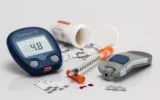Gout is a form of arthritis that can cause swelling and intense joint pain. It is caused by a buildup of uric acid in the joints and is often aggravated by certain foods and drinks, such as red meat, organ meats, alcohol, and sugary drinks. While there is no cure for gout, there are several ways to relieve the pain quickly. Here are
10 secrets to relieving gout pain quickly.
1. Use Cold Compresses: Cold compresses can help reduce inflammation and swelling, which can reduce the severity of your gout pain. Apply a cold compress, such as a bag of frozen vegetables, to the affected area for 10 minutes at a time, several times a day.
2. Take Nonsteroidal Anti-Inflammatory Drugs (NSAIDS): NSAIDS, such as ibuprofen, can help reduce inflammation and swelling, which can reduce gout pain. Talk to your doctor before taking any NSAIDs, as they can cause side effects, including stomach bleeding and ulcers.
3. Try an Epsom Salt Bath: Adding a few drops of essential oil to the Epsom salt bath can provide even more relief from gout pain. Essential oils such as lavender, peppermint and eucalyptus have anti–inflammatory and analgesic properties that can help soothe the pain and discomfort. Additionally, taking an Epsom salt bath not only helps with gout, but also aids in relaxation and stress relief. When taking an Epsom salt bath, it is important to drink plenty of water to help flush toxins out of the body. After the Epsom salt bath, use a cold compress to help reduce swelling and ease soreness. Doing this several times a week can help reduce inflammation and improve overall health.
4. Drink Plenty of Water: Drinking plenty of water can help flush out uric acid from your system, which can help reduce the symptoms of gout. Aim to drink at least 8 glasses of water a day.
5. Avoid Trigger Foods: Certain foods, such as red meat, organ meats, and sugary drinks, can trigger gout symptoms and should be avoided as much as possible. Instead, consider replacing these foods with healthier alternatives, such as lean proteins, complex carbohydrates, and low-sugar beverages. Eating more fruits, vegetables, and whole grains can also help reduce gout flare-ups by providing the body with essential vitamins, minerals, and antioxidants. Additionally, staying hydrated by drinking plenty of water throughout the day can help flush out excess uric acid and reduce the risk of gout flare-ups.
6. Eat Anti-Inflammatory Foods: Anti-inflammatory foods, such as fruits, vegetables, and fish, can help reduce inflammation and swelling, which can reduce gout pain.
7. Take Supplements: Certain dietary supplements, like omega-3 fatty acids, vitamin C, and turmeric, have been associated with decreased inflammation and swelling, which is known to help reduce the severity of gout pain. Before beginning any supplement regimen, it is important to speak to your doctor to ensure that the supplements are safe for you to take and that they won’t interact with any other medications you may be taking. Additionally, it is important to understand the proper dosage for the supplements to ensure the most effective and safest results.
8. Elevate Your Feet: Raising your feet up can be beneficial in many ways to reduce gout pain. By elevating them, it encourages increased blood flow which helps to reduce swelling and inflammation. This can also help to reduce stiffness and soreness in the joints. When sitting or lying down, it can be beneficial to prop your feet up on a pillow or other support to keep them elevated. This can help to reduce the pressure on the feet and joints, helping to reduce the discomfort and pain associated with gout. Additionally, it can help to reduce the risk of further inflammation and flare-ups, helping to keep gout pain at bay.
9. Exercise: Exercise is one of the best ways to reduce the pain and inflammation associated with gout. Regular physical activity can help reduce the severity of flare-ups, as well as prevent future episodes. Aim for 30 minutes of moderate exercise several times a week, such as walking, swimming, or jogging. Exercise also helps maintain a healthy weight, which is important for reducing gout symptoms. Additionally, exercise can help improve overall health and well being, as it releases endorphins which can reduce stress levels and improve mood. Finally, exercise can help strengthen bones and joints, which can help alleviate gout pain. So make sure you make time for some exercise each week and reap the many benefits!
10. Get Enough Sleep: Getting enough sleep is essential when it comes to helping to reduce gout pain. A lack of restful sleep can lead to an increase in inflammation and swelling, both of which can exacerbate gout pain. To ensure you are getting the necessary amount of rest each night, it is advised to aim for 7-8 hours of sleep per night. This amount of sleep will help your body to properly heal, reduce inflammation and swelling, and in turn, help reduce gout pain.
Although there is no cure for gout, there are several ways to relieve the pain quickly. By using cold compresses, taking NSAIDs, trying an Epsom salt bath, drinking plenty of water, avoiding trigger foods, eating anti-inflammatory foods, taking supplements, elevating your feet, exercising, and getting enough sleep, you can help relieve the pain of gout quickly. Talk to your doctor if your gout pain persists or worsens.






